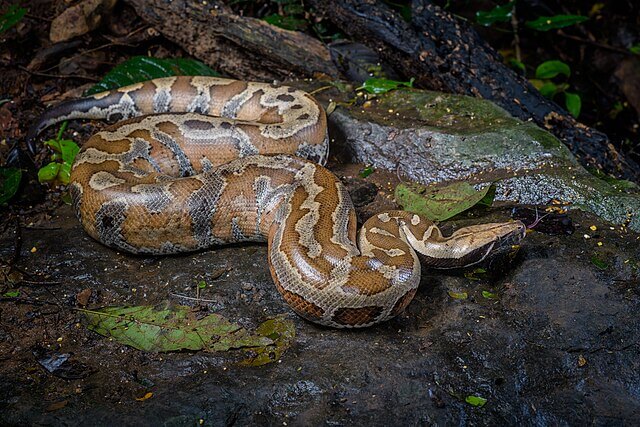
Dr. Daniel Natusch has sampled python meat in various culinary forms, likening its taste to that of chicken.
“I’ve had it barbecued. I’ve had it in satay skewers. I’ve had it in curries. I’ve had it with Indigenous people in the wilds of the Malaysian jungle,” he said.
“I’ve even done it myself as biltong – uncooked meats that are dried with herbs.”
However, procuring such an exotic dish typically requires a trip to locales like Thailand or Vietnam, where Natusch and Botswana-based ecologist Dr. Patrick Aust have conducted research on commercial python farms.
Their collaborative paper suggests that commercial python farming could present a sustainable solution to food security and climate change challenges, particularly in regions like southern Africa.
The proposed farms would rear stock from farm-laid eggs rather than capturing wild specimens, potentially including species like the Burmese python, reticulated python, and southern African rock python.
“These pythons can live for almost a month with no water. They can live off the water that sets on their scales in the morning. They can go for almost a year without eating,” Natusch said.
“We’re not necessarily saying everyone should stop eating beef and turn to pythons but there needs to be a conversation about them having a more prominent place in the agricultural mix.”
Natusch, also serving as chair of the International Union for the Conservation of Nature’s Snake Specialist Group, highlights additional benefits of python farming.
Their research indicates that pythons could offer a more resource-efficient protein source compared to traditional livestock, poultry, or salmon.
Reptiles demand less water, emit fewer greenhouse gases, exhibit greater resilience to extreme weather, and pose lower risks of disease transmission like bird flu or Covid-19.
While Natusch resides in Cairns, where crocodile meat is commonplace, he suggests that Australian palates may not be quite ready for python consumption.
“If humanity is serious about genuinely implementing sustainable practices and future-proofing ourselves, we need to start thinking outside the box,” he said.
“But I totally get that your average Australian is probably going to turn up their nose at a bit of python steak.”
Conversely, in regions like Africa and Asia, where snake consumption is less stigmatised, commercial python farming could gain traction, particularly amidst severe droughts decimating livestock populations.
“Considering Africa is currently experiencing the brunt of an unprecedented El Niño-driven drought, where conventional livestock are dropping dead in the fields, the ability to regulate metabolic processes and maintain body condition that reptiles offer during times of famine could be a gamechanger for livestock production,” he said.
Despite its potential, the likelihood of commercial python farming taking off in Australia remains slim due to the limited number of suitable species.
“We have the pygmy python over in the Pilbara – the world’s smallest species of python, that’s not much bigger than your index finger,” Natusch said.
“There aren’t too many Australian candidates you’d get an enormous fillet off – maybe a diamond python or carpet python.”
However, Lin Schwarzkopf, head of zoology and ecology at James Cook University, cautions that a comprehensive assessment of python farming’s feasibility and impacts is necessary before endorsing widespread consumption.
“There’s a basic problem with feeding people predators that I don’t see how you’re getting rid of with the pythons,” she said.
“I would need to see more information about the supply chain before I thought it was a great idea.”
While pythons grow rapidly, their cultivation poses unique challenges that warrant careful consideration.
“They need to change their body temperature voluntarily. So you have to provide them with warm areas and cooler areas. And that’s a difficult thing to do on an industrial scale, and it’s very expensive,” she said.
“What we should be doing is feeding the world with plant material if we want to support large numbers of people.”
——————————————————————————
At Natural World Fund, we are passionate about stopping the decline in our wildlife.
The decline in our wildlife is shocking and frightening. Without much more support, many of the animals we know and love will continue in their decline towards extinction.
When you help to restore a patch of degraded land through rewilding to forests, meadows, or wetlands, you have a massive impact on the biodiversity at a local level. You give animals a home and food that they otherwise would not have had, and it has a positive snowball effect on the food chain.
We are convinced that this is much better for the UK than growing lots of fast-growing coniferous trees, solely to remove carbon, that don’t actually help our animals to thrive.
This is why we stand for restoring nature in the UK through responsible rewilding. For us, it is the right thing to do. Let’s do what’s right for nature!
Donate today at https://naturalworldfund.com/ and join in the solution!

